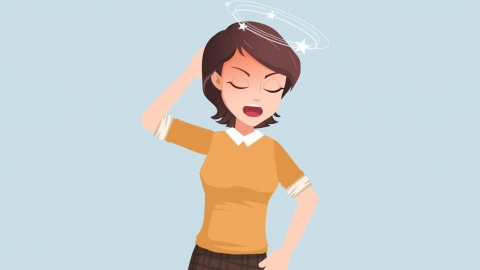What causes dizziness when standing up suddenly after squatting for a long time?
Generally, dizziness upon sudden standing after prolonged squatting may be caused by orthostatic hypotension, decreased vascular autonomic regulation, hypoglycemia, anemia, hypertension, and other reasons. Symptomatic management through general treatment and medication may be needed. If physical discomfort occurs, prompt medical attention should be sought to avoid delaying treatment. Detailed analysis is as follows:

1. Orthostatic Hypotension
When rising suddenly from a squatting or sitting position, due to gravity, a large volume of blood pools in the lower limbs, temporarily reducing blood supply to the brain and causing a brief state of low blood pressure. This may be accompanied by symptoms such as visual darkening, tinnitus, and nausea, but usually resolves spontaneously. It is recommended to change positions slowly in daily life and avoid sudden standing to help reduce the occurrence of this phenomenon.
2. Decreased Vascular Autonomic Regulation
With aging, the regulatory capacity of the vascular autonomic nervous system declines and cannot rapidly adapt to hemodynamic demands caused by postural changes, resulting in transient reduction of cerebral blood flow and dizziness. Usually, there are no other obvious accompanying symptoms. It is recommended to engage in regular physical exercise, such as jogging or swimming, to help improve cardiovascular health and vascular elasticity.
3. Hypoglycemia
Excessive fatigue after prolonged squatting may consume large amounts of glucose, leading to hypoglycemia. In hypoglycemic states, brain cells receive less energy, causing abnormal brain function and symptoms such as dizziness, palpitations, and sweating. It may also be accompanied by hand tremors and hunger. It is recommended to immediately consume carbohydrate-rich foods and, as directed by a physician, use medications such as glucose sodium chloride injection, hydrocortisone tablets, and mannitol injection to alleviate symptoms.
4. Anemia
Poor nutrition, excessive blood loss, or impaired hematopoietic function can lead to anemia. In anemic conditions, insufficient quantity or quality of red blood cells results in low hemoglobin levels, thereby affecting oxygen transport and supply. After prolonged squatting followed by sudden standing, reduced cerebral blood supply exacerbates hypoxia symptoms, causing dizziness, possibly accompanied by pallor, fatigue, and palpitations. It is recommended to take medications such as ferrous sulfate sustained-release tablets, iron(II) fumarate tablets, and ammonium ferric citrate vitamin B1 syrup II under medical guidance for treatment.
5. Hypertension
Hypertension is mainly caused by genetic factors, unhealthy lifestyle habits, and diseases. Patients with hypertension may experience sudden standing after prolonged squatting, and the abrupt blood pressure changes may increase pressure within cerebral blood vessels, leading to symptoms such as dizziness. In addition to dizziness, it may also be accompanied by headache, blurred vision, and palpitations. It is recommended to use medications such as nifedipine tablets, methyldopa tablets, and captopril sustained-release tablets under medical supervision to alleviate symptoms.
It is recommended to engage in regular physical exercise, such as walking or yoga, to enhance cardiovascular function and bodily coordination, which can help reduce physical discomfort symptoms.




